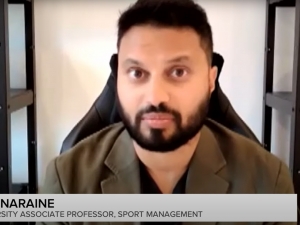 A research team at Brock University is looking for youths to discuss their preferences for spending time alone.
A research team at Brock University is looking for youths to discuss their preferences for spending time alone.A Brock University research team is asking youth to share insight into their preferences for spending time alone.
Adolescents aged 11 to 18 are needed for the ongoing study, which launched this past summer.
“We aim to draw on the experiences participants share with us to learn how and why youth spend their time alone and to provide strategies that help them use their time alone in ways that benefit their overall well-being and mental health,” says Sandra Bosacki, Professor of Educational Studies and Director of Brock’s Theory of Mind in Education (ToME) Lab.
Bosacki’s research team will be working with participants until the end of June. Research sessions, held online using Microsoft Teams, will include questionnaires and computerized tasks. The sessions will take about one hour and can be completed on participants’ personal computers with internet access at home.
“Based on our findings, we aim to promote mindful and compassionate educational programs that highlight the importance of solitude as well as social relations within learning contexts,” says Bosacki.
The team hopes the research will lead to the creation of educational materials that promote the growth of caring relationships with one’s self and others.
Parents with a child between 11 and 18 years old who would like to participate are asked to visit the ToME Lab web page or to email tomelab@brocku.ca to learn more about the research and enrol in the study. Participants will receive a $20 Amazon gift card as a thank-you for taking part.
The ToME lab is a team of researchers, educators and students interested in the development of Theory of Mind, or the ability to understand other people’s thoughts and emotions, in young people.
The current study is part of a Social Sciences and Humanities Research Council Insight Grant received by Bosacki. Over the course of five years, Bosacki and Victoria Talwar, Professor at McGill University, will conduct studies exploring how youths use their ability to think and feel to build a solid sense of self and positive relationships with others. They are particularly interested in how using skills such as emotion recognition, perspective-taking, mindfulness and kindness to others can influence the young people’s social lives, psychological well-being and school engagement.








